Archived Water Damage Blog Posts
Pipe Breaks: Causes, Prevention, and Restoration with SERVPRO of Downtown Pittsburgh/Team Dobson
1/20/2025 (Permalink)
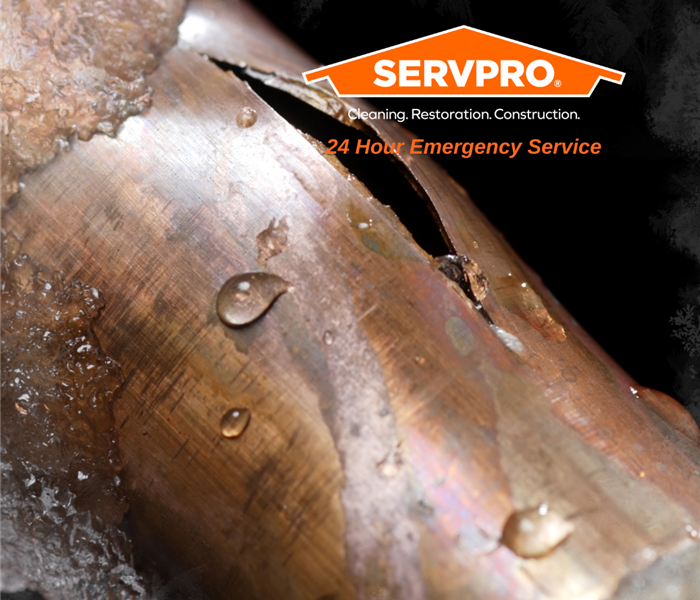 Pipe breaks are a common but serious issue that can cause significant water damage to your property.
Pipe breaks are a common but serious issue that can cause significant water damage to your property.
Pipe breaks are a common but serious issue that can cause significant water damage to your property. Whether due to freezing temperatures, corrosion, or unexpected plumbing failures, pipe breaks can disrupt your home or business and result in expensive repairs if not addressed quickly. At SERVPRO of Downtown Pittsburgh/Team Dobson, we understand the stress and challenges of dealing with water damage caused by a burst or broken pipe. This blog will explore the causes of pipe breaks, signs to watch for, and the steps you can take to prevent them. We’ll also explain how our expert team can help restore your property to its pre-damage condition after a pipe break.
What Causes Pipe Breaks?
Pipe breaks occur when there’s a sudden failure or rupture in the plumbing system. Understanding what leads to these breaks can help you take proactive measures to avoid them:
Freezing Temperatures: In the colder months, water inside pipes can freeze. As water freezes, it expands, increasing pressure inside the pipe. If the pressure is too great, it can cause the pipe to crack or burst.
Corrosion and Age: Over time, pipes can corrode, weakening their structure. Older homes are particularly vulnerable, as aging pipes can become brittle and prone to breaking.
Clogs and Blockages: Debris buildup or mineral deposits inside pipes can create blockages. This results in water pressure building up, eventually causing the pipe to fail.
Improper Installation: If pipes were improperly installed, they may be more susceptible to breakage. Poor materials or incorrect fitting sizes can lead to long-term issues.
Physical Damage: Pipes can also break if they are accidentally damaged during construction, renovations, or other activities that put stress on the system.
Signs You Might Have a Pipe Break
Sometimes a pipe break happens suddenly, but there are often warning signs to watch for. Here are some signs that could indicate a problem:
Sudden Decrease in Water Pressure: A sudden drop in water pressure throughout the home could indicate a break or leak somewhere in the plumbing system.
Wet or Damp Spots: Water stains or damp areas on the walls, floors, or ceilings are clear signs of water damage, often caused by a pipe break.
Unusual Sounds: If you hear gurgling, banging, or rushing water sounds in your pipes, it could be a sign of a blockage or an impending break.
Water Discoloration: Water that is brown, muddy, or discolored could indicate that a pipe has burst and is allowing dirt or rust to enter the water supply.
What to Do If a Pipe Breaks
If you experience a pipe break, it’s important to act quickly to minimize water damage. Follow these steps:
Shut Off the Water Supply: Immediately turn off the main water valve to stop the flow of water and prevent further flooding.
Turn Off the Electricity: If the pipe break is near electrical outlets or appliances, turn off the electricity to reduce the risk of electrical shock or fire.
Assess the Damage: Take a look at the damage caused by the break, but be careful not to wade through standing water or touch electrical fixtures.
Call SERVPRO of Downtown Pittsburgh/Team Dobson: The quicker you call, the less water damage you’ll experience. Our team is available 24/7 to provide emergency water removal and restoration services.
Why Choose SERVPRO of Downtown Pittsburgh/Team Dobson?
At SERVPRO of Downtown Pittsburgh/Team Dobson, we specialize in water damage restoration, including issues caused by pipe breaks. Here’s why we’re your go-to solution:
24/7 Emergency Response: We understand that pipe breaks can happen at any time, which is why we offer round-the-clock emergency services to minimize damage.
Fast and Efficient Service: Our team uses advanced equipment like industrial-grade dehumidifiers, moisture meters, and air movers to dry out your home quickly and thoroughly.
Comprehensive Restoration: From water extraction to structural drying and repairing damaged materials, we offer full-service restoration to get your property back to normal.
Experience and Expertise: Our technicians are highly trained and experienced in handling water damage of all types. We have the knowledge and tools to fix your home’s plumbing and restore it to its original condition.
Preventing Future Pipe Breaks
While you can’t always prevent a pipe break, there are steps you can take to reduce the likelihood of one occurring:
Insulate Exposed Pipes: Ensure pipes in unheated areas like basements, attics, or crawl spaces are properly insulated to prevent freezing.
Maintain a Consistent Temperature: Keep your home’s temperature steady, especially during the winter months, to prevent pipes from freezing.
Regular Pipe Inspections: Schedule regular plumbing inspections to check for signs of corrosion or wear and tear on your pipes.
Clear Debris and Blockages: Make sure your drains and pipes are free of debris that could lead to clogs or increased pressure.
Conclusion
Pipe breaks are a serious issue that can lead to significant water damage, but with the right knowledge and professional help, they don’t have to be devastating. If you’re dealing with a pipe break or other water damage, call SERVPRO of Downtown Pittsburgh/Team Dobson for fast, reliable service. We’re ready to restore your home or business to its pre-damage condition and help you avoid future water issues.
How Can I Avoid Frozen Pipes?
1/19/2024 (Permalink)
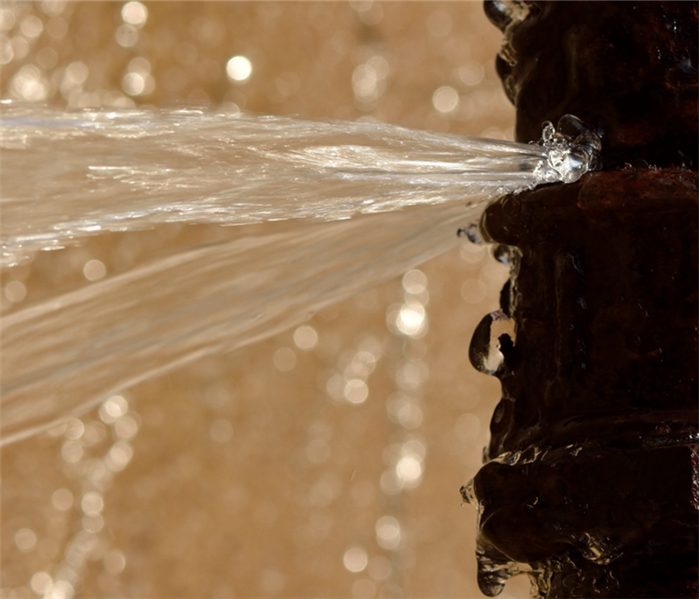 Taking proactive steps to winterize your home can save you from the hassle and expense of dealing with frozen pipes.
Taking proactive steps to winterize your home can save you from the hassle and expense of dealing with frozen pipes.
Frigid temperatures are upon us, to avoid frozen pipes its essential to prepare your home for the colder temperatures to prevent the inconvenience and potential damage caused by frozen pipes. Frozen pipes can lead to burst pipes, water damage, and costly repairs. Here are some helpful tips to winterize your home and protect your plumbing system.
- Insulate Exposed Pipes: One of the most effective ways to prevent pipes from freezing is to insulate them. Insulation helps retain heat and keeps the pipes at a stable temperature. Use pipe insulation sleeves or wrapping material to cover exposed pipes in unheated areas, such as the basement, crawl spaces, and attics.
- Seal Leaks and Gaps: Inspect your home for any gaps or cracks that could allow cold air to enter and affect your pipes. Seal these openings with caulk or insulation to prevent drafts. Pay special attention to areas where pipes enter your home, as these are common points for cold air infiltration.
- Disconnect and Drain Outdoor Hoses: Before the winter freeze sets in, disconnect all outdoor hoses and drain the water from them. A frozen hose can lead to back pressure in the pipes inside your home, increasing the risk of freezing. Store hoses in a dry place to prolong their lifespan.
- Locate and Shut Off External Water Sources: If you have external water sources, such as sprinkler systems, make sure to turn off the water supply and drain the pipes. This will prevent water from freezing and causing damage to the system.
- Keep Interior Temperatures Consistent: Maintain a consistent temperature inside your home, especially during extremely cold nights. Set your thermostat to a temperature that will keep the interior warm enough to prevent pipes from freezing. Even when you're away, avoid turning off the heating system completely.
- Let Faucets Drip: On exceptionally cold nights, allow faucets to drip slowly. This continuous flow of water helps prevent freezing by relieving pressure in the pipes. Focus on faucets located along exterior walls and those in colder areas of your home.
- Use Heat Tape: For added protection, consider using heat tape on vulnerable pipes. Heat tape is designed to provide a constant source of low-level heat, helping to prevent freezing. Follow the manufacturer's instructions for proper installation.
- Open Cabinet Doors: In kitchens and bathrooms, open cabinet doors to allow warm air to circulate around pipes located under sinks. This is especially important for pipes along exterior walls, as these are more susceptible to freezing.
Taking proactive steps to winterize your home can save you from the hassle and expense of dealing with frozen pipes. By insulating, sealing gaps, disconnecting outdoor hoses, shutting off external water sources, maintaining consistent interior temperatures, letting faucets drip, using heat tape, and opening cabinet doors, you'll be well-prepared to face the winter months without the worry of plumbing issues. Stay warm, stay dry, and enjoy a worry-free winter in your well-protected home.
If you experience water damage in your home or place of business SERVPRO of Downtown Pittsburgh / Team Dobson is Here to Help®. We are a locally owned and operated company with national resources, so we can handle any size job. We will respond immediately, and we have the expertise and equipment to restore your property as quickly as possible.
Give us a call at (412) 474-0911 or visit our website for more information!
Who to Call When Water Damage Strikes Your Pittsburgh Home
10/23/2023 (Permalink)
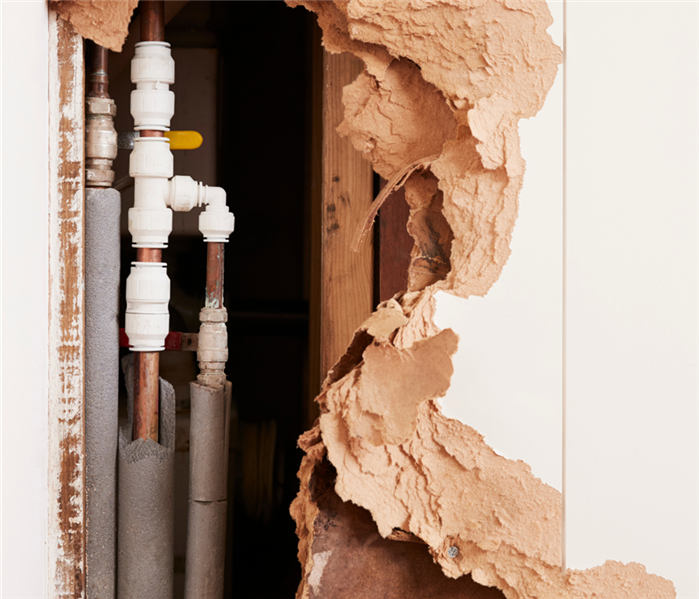 Frozen pipes can cause them to burst, leading to water damage in homes and buildings.
Frozen pipes can cause them to burst, leading to water damage in homes and buildings.
Winter water damage to Downtown Pittsburgh, North Shore, and surrounding area homes is a common problem due to freezing temperatures, ice dams, and burst pipes. Frozen pipes can cause them to burst, leading to water damage in homes and buildings. Ice dams can also cause water to seep into walls and ceilings, leading to mold growth and structural damage. It's important to take preventative measures such as insulating pipes, sealing windows and doors, and clearing gutters to prevent water damage during the winter months. If water damage occurs, it's essential to quickly remove standing water and properly dry out affected areas to prevent further damage and mold growth.
If you experience water damage in your home SERVPRO of Downtown Pittsburgh/Team Dobson is available 24/7 to help you. We offer water damage testing to detect water in your ceiling, floors, and walls. Our team is made up of experienced and skilled professionals that are ready to help whenever emergency disasters strike. If you ever need immediate assistance, don’t hesitate to give us a call, (412) 474-0911 or visit our Website to learn more.
How to Prevent Water Damage in Your Pittsburgh Commercial Building
9/15/2023 (Permalink)
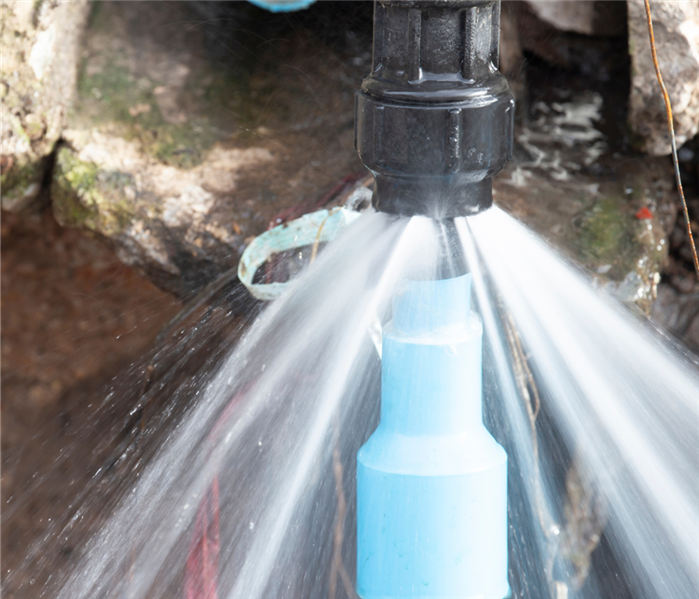 If you detect leaks in the ceiling or walls, you may want to repair them immediately to avoid long term damage.
If you detect leaks in the ceiling or walls, you may want to repair them immediately to avoid long term damage.
Commercial water damage can occur when you experience heavy rains. Water can come in through drains, walls, and ceilings. It is important to make sure your plumbing and pipes are working correctly in order to avoid water damage. If you detect leaks in the ceiling or walls, you may want to repair them immediately to avoid long term damage. SERVPRO of Downtown Pittsburgh/Team Dobson is Here to Help.
There are several ways to avoid commercial water damage:
- Regularly inspect and maintain all plumbing systems, including pipes, fixtures, and appliances.
- Ensure proper drainage around the building and maintain any exterior landscaping that could contribute to excess water buildup.
- Install sturdy, leak-proof roofing materials and keep gutters and downspouts clear of debris.
- Be prepared for emergencies by having a plan in place and educating employees on proper response procedures.
- Consider investing in commercial water damage insurance to provide added protection and peace of mind.
If you happen to experience water damage in your Downtown Pittsburgh or surrounding areas commercial property, don’t hesitate to reach out. Call (412) 474-0911 for immediate assistance or visit our Website to learn more.
Can Water Damage be a Safety Hazard for Downtown Pittsburgh Homeowners?
7/14/2023 (Permalink)
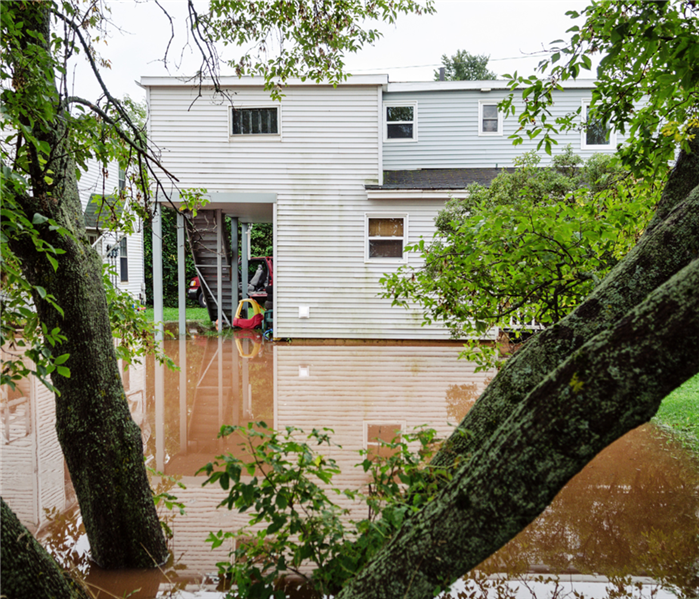 With all of the complications and hazards with water damage, it’s best to call the professionals.
With all of the complications and hazards with water damage, it’s best to call the professionals.
We know water damage can be overwhelming. You’re worried about your possessions and the damage to your home. But you may need to be concerned for YOUR health and wellbeing in a water damage situation too. Here are some things you need to keep in mind when you have water damage in your Pittsburgh home.
Water and electricity do not mix well for you and your safety. When there’s water in your home, make sure you’re cautious and don’t use appliances in affected areas.
This may seem silly but be cautious of slipping and falling when it comes to excess water. You don’t want to see a physical injury to go along with the damage water creates in your North Shore home.
If you see water damage on the ceiling, be extra careful. If your ceiling has water stains, the room above it has water damage, or the ceiling is sagging, stay out of the room. The last thing you need is to be in the room when your ceiling falls.
Keep those in mind and check out SERVPRO of Downtown Pittsburgh/Team Dobson’s full list of flood tips here.
With all of the complications and hazards with water damage, it’s best to call the professionals. SERVPRO of Downtown Pittsburgh/Team Dobson has highly trained water restoration technicians ready to respond to any size disaster. Call us today at (412) 474-0911 or visit our Website to get your home to preloss condition fast!
 Pipe breaks are a common but serious issue that can cause significant water damage to your property.
Pipe breaks are a common but serious issue that can cause significant water damage to your property.







 24/7 Emergency Service
24/7 Emergency Service



